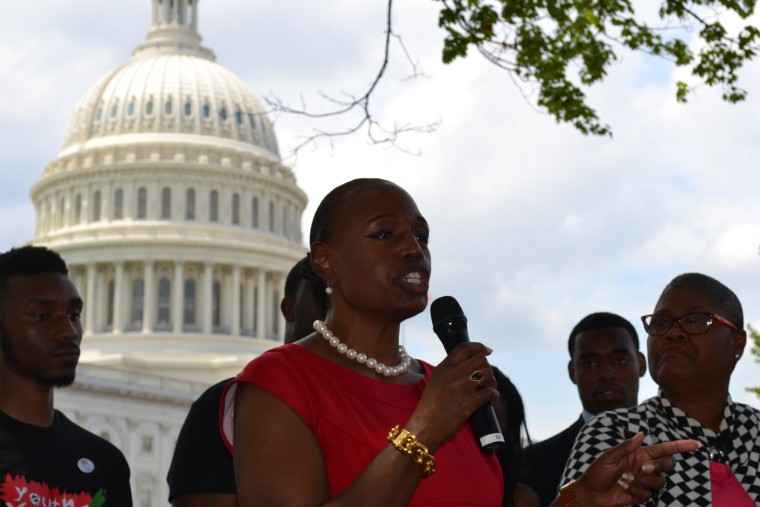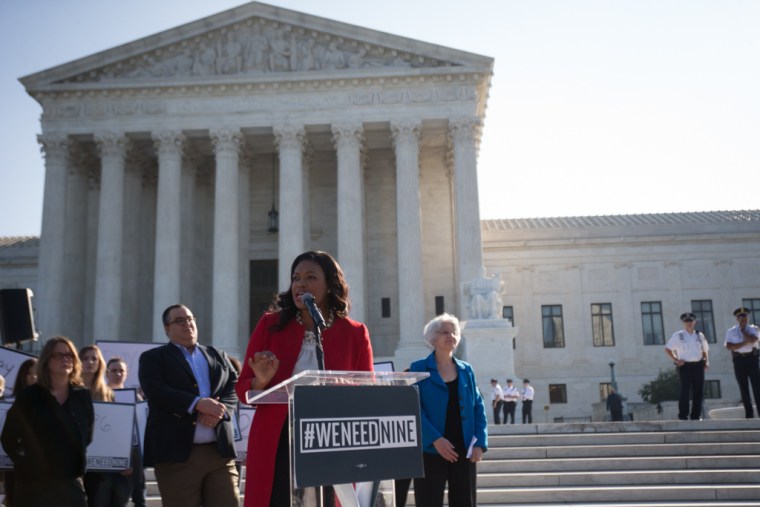With issues like affirmative action, immigration, criminal justice reform and income inequality being central to progress in African American community, legal experts and political strategists say voters of color should take this election seriously.
“This election is critical for people of color because the next president will likely be choosing at least two, and possibly as many as four, Supreme Court justices,” said Tharon Johnson, a Democratic Strategist based in Atlanta.
As Johnson puts it, the Supreme Court decision to gut a key provision of the Voting Rights Act of 1965 "opened the floodgates to new, racially motivated attacks on voting rights."
"Our Supreme Court justices are, in theory, unbiased interpreters of the Constitution, but clearly split along ideological lines of conservative and progressive,” he continued.
Yet, rulings like the court’s landmark same-sex marriage decision or affirmative action ruling are examples of what happens when the court’s decisions are reminiscent of a more progressive agenda.

According to Nicole Austin-Hillery, Director and Counsel of The Brennan Center, the stakes are high and this election may tip the scales. “We are at a turning point where changes to the court could expand the progressive agenda for the next two or three decades based on the decisions of the court. And with those remaining, the court is evenly split in terms of conservative versus progressive justices,” said Austin-Hillery.
How African Americans vote is of the utmost urgency, said Johnson. “The selection of the next justices could lead to diminished voting rights for the African-American community,” he said. “It could impact the legality of key affirmative action programs. It could determine the viability of new health care programs that many minority communities rely on. The possibilities are endless.”
In October, the Center for American Progress published a report on why the Supreme Court matters to communities of color. In the report, co-written by Michele Jawando, they highlighted momentous court cases while displaying cases that may potentially reach the court in the coming season.
“For communities of color, the U.S. Supreme Court has a checkered past,” the report states.
The report lists the historic Plessy v. Ferguson as well as Brown v. Board of Education as a few cases that have altered history.

“As the Supreme Court begins its new term with several important cases involving the intersection of race and the justice system,” Jawando, who is vice president for Legal Progress at CAP, told NBCBLK, “We thought it was particularly important to highlight the impact that the Supreme Court has on communities of color and the impact that the presidential election may have on the Supreme Court.”
West Virginia v EPA, a case involving 24 states against President Barack Obama’s clean power plan, as well as a few cases attempting to invalidate voting laws in a handful of states including Texas, North Carolina and North Dakota could potentially make their way to the court in the next season. And with three justices surpassing the age of 80 during the next president’s first term, the next president could shape the identity of the court and influence the rights of countless Americans of color.
This summer rumors swirled that Justice Clarence Thomas, who recently recognized 25 years on the court, is considering retirement. “A lot of people are saying he is really feeling lost without Scalia on that court,” Austin-Hillery said.
RELATED: Common Raps Politics and Policy on New Album, 'Black America Again'
If Justice Thomas were to step down, Austin-Hillery suggests members of the Black community would see his departure as a chance to once again have a voice that can speak for black America and brown people.
“Black America would rejoice,” she said. “Folks have yet to get over the fact that when Justice Marshall stepped down he was replaced by Justice Thomas and that the voice and the conscience of black America on the court was lost.”
Any retirement, said Jawando, could pose a tremendous opportunity.
“The judges that our next president appoints will therefore have an indelible mark on whether the judiciary and the law are reflective of the experiences of the African-American community,” she said. “There will be an opportunity to move forward and expand rights, or an opportunity to shift the law backwards and turn the clock back on civil rights, workers’ rights, women’s rights, and immigrants’ rights.”
And for those considering not voting at all, Johnson considers the decision as risks that communities of color cannot afford.
“Sitting out this election means risking much of the progress we’ve fought for, not just over the last eight years,” he warns, “But the last 40 years.”
